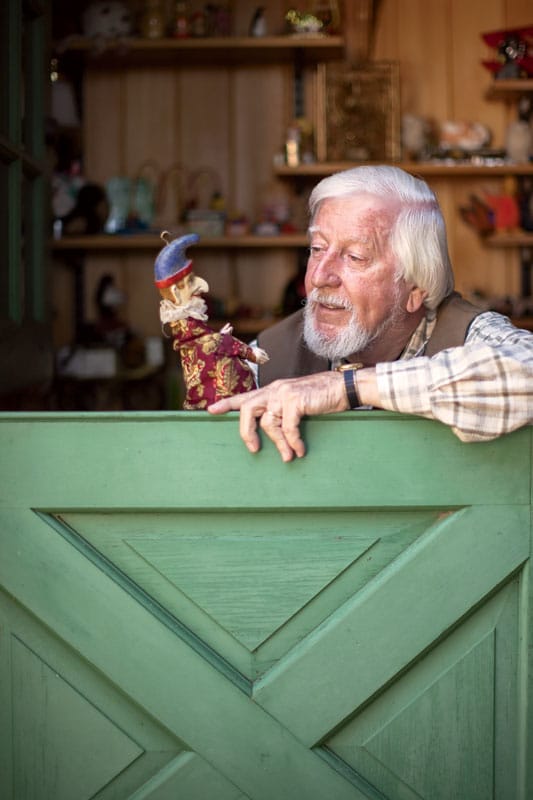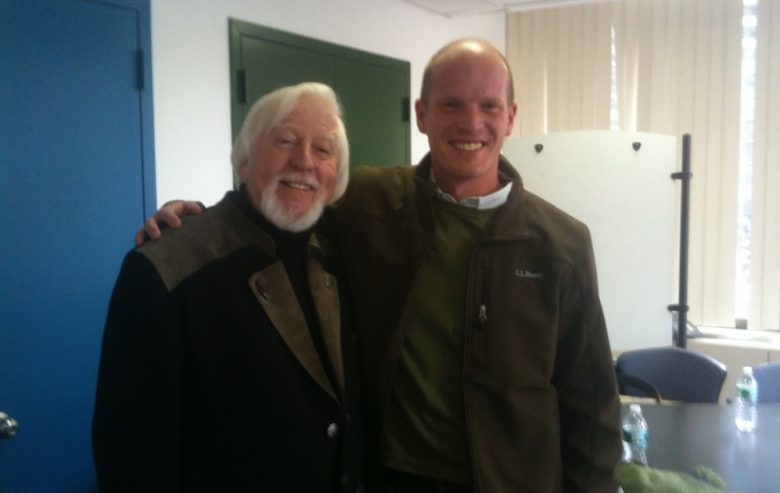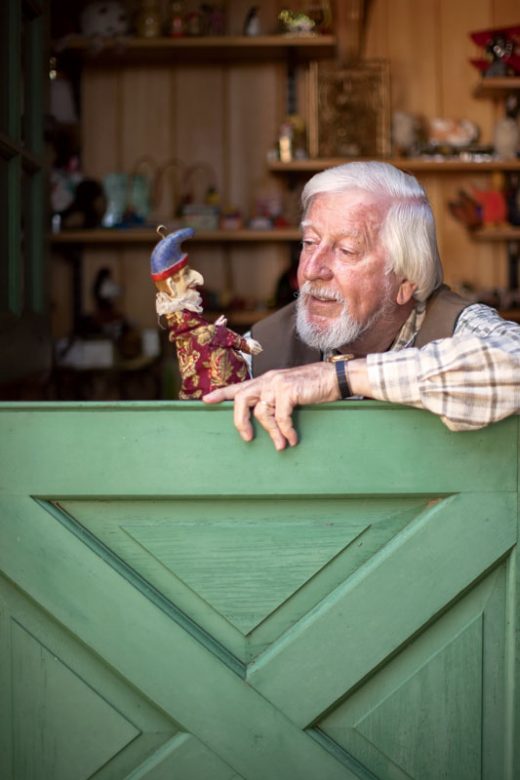Remembering Caroll Spinney, the Man Who Played Big Bird
A Yankee editor looks back on his day with the Sesame Street legend and personal hero.

Carroll Spinney’s first exposure to the world of puppets and performance came as a kindergarten student in his hometown, Waltham, Massachusetts. Both have been passions of his ever since.
Photo Credit : Carl Tremblay
Photo Credit : Yankee Magazine
“I loved that you could do a story with your hands and a voice,” he recalled. “I built a puppet theater in our barn using old lumber and old orange crates. I had a monkey and a snake, and maybe 16 people showed up. They paid a penny each. I remember everyone going away smiling.
“When I was 12,” he continued, “I saw my first children’s television show — and there was a puppet on it. The guy just wiggled him about; he didn’t lip-sync. I was already doing shows where the puppets talked and I had learned to lip-sync. I thought, Gee, I’m a better puppeteer than he is, and I’m only 12. I told my mother, ‘When I grow up, I’m sure I can get a job in television.’ His bad work made me sure of it.”
Spinney, who wore his white hair long and kept a neatly trimmed goatee, was a natural storyteller. His charm lay in the fact that many of the building blocks he used to create the Big Bird character were a part of his own personality. There was a boyish enthusiasm about him, along with a soft kindness that neither age nor celebrity had diminished.
“I think most people forgot what it was like being a kid by the time they grow up,” he told The New York Times back in 1982. “But I never got over it. It was almost a problem for me, in fact, trying to grow up enough, even when I went into the Air Force.”
As Spinney talked to me about his career and life, he seemed kind of amazed at the tale he was telling. There were Emmys and Grammys and lifetime achievement awards. He’d written books and worked with and met numerous A-list celebrities, from Bob Hope to Jerry Seinfeld. He crossed paths with American presidents as well as many of his cultural heroes, like Andrew Wyeth and Walt Disney.

Photo Credit : Carl Tremblay
“The epiphany for me of when Big Bird had become a big cultural icon was around 1975, when I went into a little bookshop on Broadway, and I saw one of the Little Golden Books,” he recalled. “Listed on the back were other Golden Books that children might enjoy. There was Mickey Mouse and Minnie dancing. There was Donald Duck and Daisy. There was Yosemite Sam and Bugs Bunny. And there was Big Bird and Oscar. I thought, I’ve gotten into that world. It’s really established. It was a wonderful feeling.”
With me being a child of the 1970s, our whole conversation held a special thrill. Big Bird, Oscar, and the entire Sesame Street gang had been a central part of my early youth. At one point, early in our talk, I brought up the character of Oscar and Spinney’s approach to playing him. “Oscar is just a grouch,” he said. “He’s not nasty; he’s just irritable. There will be days [when] I’ve had the Bird all day long, and it’s nice to know I’ve got the Grouch coming up, where I can go” — and here he slipped into that signature Oscar growl — “‘Heh, heh, heh … Come here, Bob, try my electric spoon.’”
I wasn’t just star-struck — I felt like I’d slipped back into the shoes of a 6-year-old who had waited patiently all afternoon to tune into WGBH in Boston to watch Sesame Street. I can still feel it a little as I write these words.
Spinney spent his entire life making sure that the work he did wasn’t just good, but also good for the children he knew were watching him on television. When he took the job with Jim Henson at Sesame Street, he left a more stable and more lucrative job on Bozo the Clown, a children’s television show also produced in Boston. “I didn’t find the Bozo thing particularly worthwhile,” he said. “The money wasn’t as important to me as doing something better.”
So, he leapt — into some uncertainty, perhaps, but also into the opportunity to do something big. When I met him some 41 years after he decided to join Henson, Spinney sounded genuinely grateful for everything that had come his way.
“Everything I’m doing I dreamed of doing,” he said. “People will say to me, ‘You have the greatest job in the world.’ And I’ll go, ‘Yes, I do.’”
See More: How Do You Become a Big Bird? | The Big Question with Muppeteer Carroll Spinney
Ian Aldrich
Ian Aldrich is the Senior Features Editor at Yankee magazine, where he has worked for more for nearly two decades. As the magazine’s staff feature writer, he writes stories that delve deep into issues facing communities throughout New England. In 2019 he received gold in the reporting category at the annual City-Regional Magazine conference for his story on New England’s opioid crisis. Ian’s work has been recognized by both the Best American Sports and Best American Travel Writing anthologies. He lives with his family in Dublin, New Hampshire.
More by Ian Aldrich

